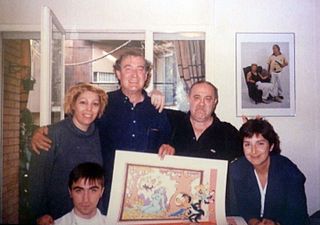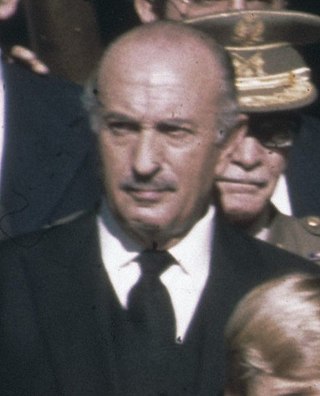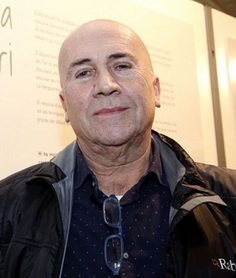Related Research Articles
Anarchist communism is a far-left political ideology and anarchist school of thought that advocates communism. It calls for the abolition of private property but retention of personal property and collectively-owned items, goods, and services. It supports social ownership of property and the distribution of resources.

Luis V. Rey is a Spanish-Mexican artist and illustrator. A 1977 graduate of the San Carlos Academy, part of the National Autonomous University of Mexico, he was among the contributors of the weekly Barcelona satirical magazine El Papus.
The Argentine Anticommunist Alliance was an Argentine Peronist and fascist political terrorist group operated by a sector of the Federal Police and the Argentine Armed Forces, linked with the anticommunist lodge Propaganda Due, that killed artists, priests, intellectuals, leftist politicians, students, historians and union members, as well as issuing threats and carrying out extrajudicial killings and forced disappearances during the presidencies of Juan Perón and Isabel Perón between 1973 and 1976. The group was responsible for the disappearance and death of between 700 and 1100 people.
Mujeres Libres was an anarchist women's organisation that existed in Spain from 1936 to 1939. Founded by Lucía Sánchez Saornil, Mercedes Comaposada, and Amparo Poch y Gascón as a small women's group in Madrid, it rapidly grew to a national federation of 30,000 members at its height in the summer of 1938.
El Jueves is a Spanish weekly satirical magazine based in Barcelona.
Spanish comics are the comics of Spain. Comics in Spain are usually called historietas or cómics, with tebeos primarily denoting the magazines containing the medium. Tebeo is a phonetic adaptation of TBO, a long-running (1917–1983) Spanish comic magazine, and sounds like "te veo".

Manuel Vázquez Gallego, was a Spanish cartoonist. He was one of the most important artists of Editorial Bruguera.
Alfons Figueras i Fontanals was a Spanish cartoonist. He created characters such as Aspirino y Colodión or Topolino, el último héroe

Alejandro Rodríguez de Valcárcel y Nebreda was a Spanish falangist politician and State lawyer, who served in important positions during the dictatorship of Francisco Franco.
Cambio 16 is a Spanish language monthly current affairs magazine published in Madrid, Spain, by "Group 16".
El Víbora was a Spanish language monthly alternative comics magazine published in Barcelona, Spain, between 1979 and 2005, with a peak monthly circulation of 80,000 copies. The magazine was subtitled "Comix for Survivors".
The Alianza Apostólica Anticomunista was a Spanish far-right paramilitary organisation active from 1976 to 1983, primarily in the southern Basque Country but also in the French Basque Country and Barcelona. A June 2010 report by the Office for Victims of Terrorism of the Basque Government attributed eight murders with 66 deathly victims to the group and linked it to the National Police Corps, SECED and the Civil Guard. The group attacked the satirical magazine El Papus in Barcelona, killing one person and injuring 17.
Carlos Giménez is a Spanish comics artist.

Fotogramas is a Spanish digital and print film magazine which has been in circulation since 1946. It is one of the early film magazines in Spain.

The Frente de Liberación Homosexual was a gay rights organization in Argentina. Formed at a meeting of Nuestro Mundo in August 1971, the FLH eventually dissolved in 1976 as a result of severe repression after the 1976 Argentine coup d'état.
Anarchism in El Salvador reached its peak during the labour movement of the 1920s, in which anarcho-syndicalists played a leading role. The movement was subsequently suppressed by the military dictatorship before experiencing a resurgence in the 21st century.
Anarchism in Guatemala emerged from the country's labor movement in the late 19th century. Anarcho-syndicalism rose to prominence in the early 20th century, reaching its peak during the 1920s, before being suppressed by the right-wing dictatorship of Jorge Ubico.
La Codorniz was a weekly satirical magazine which was published in Madrid, Spain, between 1941 and 1978. From its start to 1951 its subtitle was Revista de Humor. Then it was changed to La revista más audaz para el lector más inteligente. It is often cited as the most known Spanish satirical magazine in the Francoist Spain and transition period.
Barrabás was a weekly graphical humor and political satirical magazine focusing on football news published in Barcelona between 1972 and 1977.

Antoni Batllori Obiols, best known as Toni Batllori, was a Spanish satirical cartoonist, illustrator, and sculptor.
References
- 1 2 3 4 5 Gerardo Vilches (Autumn 2018). "Satirical Panels against Censorship: A Battle That Raged during the Spanish Transition". European Comic Art. 11 (2). doi:10.3167/eca.2018.110203. S2CID 192855121.
- 1 2 3 4 5 6 7 8 María Iranzo Cabrera (2020). "(Re)negotiating Freedom of Expression in the Spanish Transition: The Case of El Papus (1973–1987)". Bulletin of Spanish Visual Studies. 4 (2): 210, 213, 217, 222–223, 229, 235. doi:10.1080/24741604.2020.1825126. hdl: 10550/79018 . S2CID 225145220.
- 1 2 3 4 Frances Salgado de Dios (September 2020). "The market for satirical magazines in late Francoism and the Transition (1970-84): Dissent and political opposition". International Journal of Iberian Studies. 33 (2–3): 199, 202. doi:10.1386/ijis_00028_1. S2CID 234671562.
- ↑ Rhiannon McGlade (2016). Catalan Cartoons: A Cultural and Political History. Cardiff: University of Wales Press. p. 209. ISBN 978-1-78316-805-7.
- ↑ María Iranzo Cabrera; Josep Lluís Gómez Mompar (2020). "El sexismo de la revista satírica El Papus (1973-1987). La lacra que cuestiona su papel liberador en la Transición española". Historia y comunicación social (in Spanish). 25 (2): 399–413. doi:10.5209/hics.72272. hdl: 10550/79011 . S2CID 230645001.
- 1 2 "Forty years since the attack on 'El Papus'" (in Spanish). Memòria Democràtica. 18 September 2017. Archived from the original on 19 November 2020. Retrieved 13 November 2022.